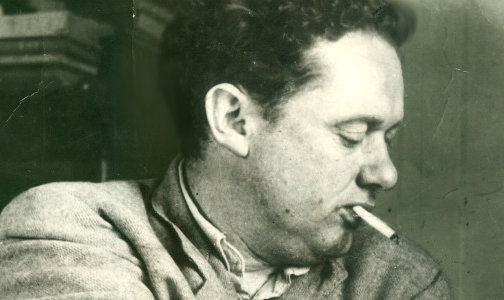
Responding to a letter from Pamela Hansford Johnson, who had written to him after seeing his poem “That sanity be kept” in the “Poet’s Corner” of the Sunday Referee newspaper, to which they both contributed, nineteen-year-old Dylan Thomas gives an unsparing critique of his poetic contemporaries.
Blaen-Cwm Llangain nr Carmarthen
[mid-September 1933]
Beginning this letter in the way I do, removes the necessity of using the formal, ‘madam’, the stiff, ‘Miss Johnson’, (rather ambiguous but entirely unmeant), and the impudent, ‘Pamela’, (also ambiguous, also unmeant). It removes a similar obstacle in your case…
I can’t agree with you that the majority of the Referee poems are good. With a few exceptions they are nauseatingly bad. Yours are among the exceptions, of course…What did you think of last week’s ‘Blue Gum Tree’? That is a real test of taste…It would be hard to realise the number of people bluffed into believing ‘Blue Gum Tree’ to be a good poem. Its sprawling formlessness they would call, ‘modern’, its diction, ‘harsh but effective’, and some of its single lines, such as ‘The cloth of silver over a white balustrade’, would send them into some sort of colourful rapture. In reality, the formlessness is the outcome of entire prosodical incompetence, the diction is not even tailor-made but ready-to-wear, and the ‘colourful’ lines are like cheap, vermilion splotches on a tenthrate music-hall backcloth…
There was a time when only poets were called poets. Now anyone with an insufficient knowledge of the English language, a Marie Corelli sentiment, and a couple of ‘bright’ images to sprinkle over the lines, is called a poet. He can’t even leave his excretion in a private spot. They give him a public ‘[Poet’s] Corner’ to leave it in. (A vulgar metaphor! I hope you don’t object.)
This is in no way a biased or personal attack. It’s the general principles of the thing I like to use as Aunt Sallies…A physical pacifist and a mental militarist, I can’t resist having a knock—or even a blow at a dead horse—when all I put my faith in is utterly contradicted. I put my faith in poetry, and too many poets deny it.
To return to your poetry, (you must excuse my slight soap-box attitude): It shows a tremendous passion for words, and a real knowledge of them. Your grasp of form and your handling of metre is among the best I know to-day. And—the main thing—your thoughts are worth expressing. Have you written a great deal? When do you write? I’m interested to know all sorts of things like that, and to see more.
What I like about your poems is that they state, not contradict, that they create not destroy. Poem after poem, recording, in sickening detail, the wrinkles of the author’s navel, fill the contemporary journals, poem after poem recording, none too clearly, the chaos of to-day. Out of chaos they make nothing, but, themselves part of the post-war carnage, fade away like dead soldiers. So much new verse (do you know ‘New Verse’?) can be summarised into ‘Well, there’s been a hell of a war; it’s left us in a mess; what the hell are we going to do about it?’ The answer is fairly obvious. But is it worth writing about? No, you answer in a loud voice, or at least I hope you do. You are not like that, and your ‘not-ness’ alone is worth all the superlatives at my command.
So you are the same age as myself. You say one has enough time, when one is 21, to be modest. One has enough time ahead, too, to regret one’s immodesty. The more I think of my Referee poem the less I like it. The idea of myself, sitting in the open window, in my shirt, and imagining myself as some Jehovah of the West, is really odd. If I were some Apollo, it would be different. As a matter of fact, I am a little person with much untidy hair.
With this letter you will find two poems of mine. I am sending them to show you, or to hope to show you, that I can do much better than you think from what you have seen of mine…
After my violent outburst against the Referee poets, you’ll probably read my two poems with a stern & prejudiced eye. I hope you don’t, and I hope you like them. Whether you do or not, tell me.
Can I keep your poems a little longer?
Dylan Thomas
P.S. The Woman poem [“The Woman Speaks”] is to be printed in the Adelphi. I can’t resist adding that, because I like the magazine so much…
P.P.S. I am staying, as you see, in Carmarthenshire & have forgotten to bring your address with me. I am trusting to luck that 13 is the right number. If it is, you will read this explanation. If it isn’t, you won’t. So there was no point at all in writing it. D.T.
From Dylan Thomas: The Collected Letters. Edited by Paul Ferris. London: Paladin, 1987. 984 pp.


